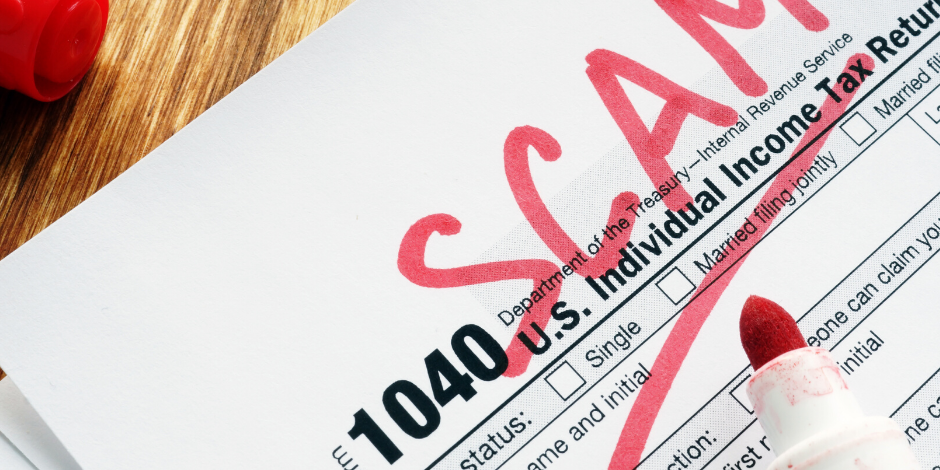Tax Scams

They say only two things in life are certain: death and taxes. But these days, it seems that getting scammed by IRS imposters is also likely. While the American taxpayers are busy filing taxes, there’s a small group that has been working hard to scam innocent people out of their hard-earned money.
Statistics show that thousands of people fall prey to tax scammers each year, and considering this is the tax season, it’d be wise to be mindful of the common tax scams in 2019, such as:
- Getting calls from IRS agent imposters
- Scammers filing your tax return with your stolen ID
- Getting fake emails about a tax refund
- Fake tax preparers.
Getting Calls From IRS Agent Imposters
Things got relatively worse when scammers or fake IRS agents figured out how to make their caller ID show up as the IRS. Once the targeted victim picks up the phone, the scammer claims that some IRS payment is urgently due and if they don’t pay up, they will get arrested.
At this point, many innocent people get scared into taking action, but if they don’t, the scammer calls again, pretending to be from the DMV or police.
So be cautious and keep in mind that the IRS never:
- Threatens to bring cops to have you arrested for not paying
- Calls to demand immediate payment (they will first send you a bill in the mail, if you owe any taxes).
- Demands payment without giving you the chance to appeal or question the amount “you owe”.
- Asks you to use a specific payment method to pay the money, like wire transfer, gift cards, or prepaid debit card.
- Asks for debit or credit card numbers over the phone.
Scammers Filing Your Tax Return
This is one of the most common ways a tax scam works: When you go to file your taxes, you find out that you already have – or worse, someone else has been using your Social Security Number. Identity theft is a real concern in this country and one sure shot way to avoid it is to file your taxes early.
The longer you wait, the more chance the scammer has to file a fake return and take off with your refund. Meanwhile, you’ll be left behind sorting through the mess with IRS.
Also, if you filed a federal tax return last year that listed your address in the following states:
- Georgia
- Florida
- Michigan
- District of Columbia
- California
- Nevada
- Maryland
- Rhode Island
- Illinois
- Delaware
Or, you received a letter from the IRS enabling you to opt-in, you can request a Tax Identity Protection (IP) Pin. This way, the IRS will send you a new IP pin every year, and you can’t file your taxes without it.
Getting Fake Emails About A Tax Refund
There are some tax scams where the scammer sends out an email (that looks like it’s from the IRS), and claims that there is a refund for you. They will say that you just need to enter your banking information and Social Security Number, and the refund amount is yours.
Sometimes, when it sounds too-good-to-be-true, it usually is.
Another form of this scam is, you will get a fake IRS email that says you are in trouble; this email will also include a part of your old tax return to prove it’s real. Then, when you click on the attachment, you download a malware in your computer which compromises every vital piece of information you have there.
So, make sure you only hire someone you know; don’t just go with anyone you have never heard of.
To Sum it Up
If you know the tell-tale signs of a tax scam, it is easy to avoid them. Here are a few tips to help you protect against such scams:
- Don’t respond to the IRS emails or listen to calls from the IRS.
- Be careful with your account passwords (change them frequently and don’t share them with anyone).
- File your tax returns early.
- Don’t click on “download attachments” file or attached links in emails that claim to be from the IRS.
- Don’t ever use public internet (Wi-Fi) to do banking transactions or when filing returns.
- If you receive a bill (through mail or email), always check with the IRS to ensure its authenticity.
- Think before you act: the IRS is a government agency, not the Mafia. They will never force you to pay or make a decision on the spot. Never succumb to the pressure of claims like “you have to pay immediately”.
The IRS is a traditional institution. It never makes contact via email, text messages, phone calls, or social media. Whether you owe any back taxes or the IRS owes you a refund, the real agency will never call, email, or text you about it – they will send a letter in the postal mail. Unfortunately, scammers are known to send letters as well so use your caution.
If you receive any such calls, be sure to contact the IRS directly at 800-829-1040 to find out whether the call was legitimate. At Phoenix Tax Consultants we staff IRS Enrolled Agents and are here to help should you have any questions.
Categories
Calculators Events Featured Julie's Blog Tax Blog Tax Tips Testimonial UncategorizedRecent Posts
Choosing Between Single MFJ or Head of Household Filing Status Should You Adjust Your W-4 to Withhold More or Less? Twelve Ways to Maximize Your 2025 Tax Return Paying Taxes on Cryptocurrency Gains How Tax Law Changes Impact Your Tax Planning





